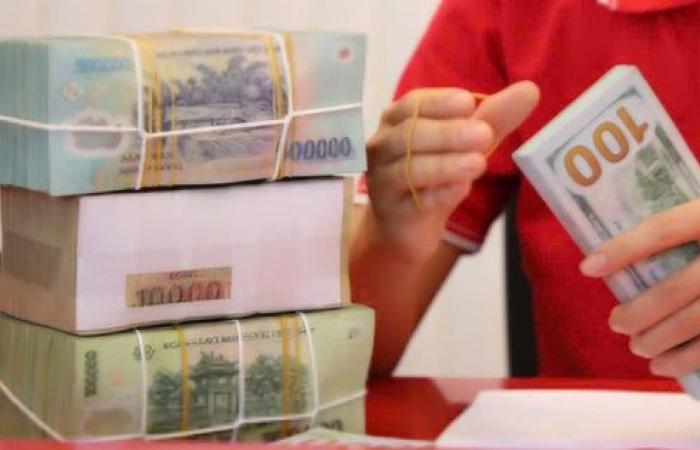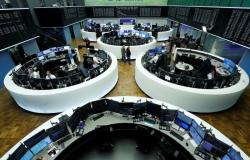On January 6, the central exchange rate was set by the State Bank of Vietnam (NHHN) at 1,24,337 VND/USD. Prices in USD in commercial banks are trading around 25.253 VND/USD for purchase and 25.553 VND/USD for sale. In particular, the USD index (DXY) in the international market has exceeded 100 points and is at its highest level in more than 100 years, putting strong pressure on the domestic exchange rate.
Magnetic pressure world
International analysts say the value of the dollar has risen recently because the US Federal Reserve (FED) is only expected to cut interest rates by a total of 2 percentage points in 2018, instead of four times as announced in September 1.
In this context, financial organizations and experts predict that the pressure on the VND/USD exchange rate will continue to increase in 2025. According to Dr. Nguyen Tri Hieu, an expert in banking finance, the DXY index ranges from 101 to 107 points directly affected. the USD/VND exchange rate. When the dollar appreciates, the VND falls, creating benefits for exports but causing difficulties for importing raw materials, pushing up raw material prices and affecting inflation.
The rise in the price of the US dollar exerted strong pressure on the exchange rate in Vietnam from the start of the year. Photo: LAM GIANG
Mr Hieu predicted that in 2025, the exchange rate will be strongly influenced by the economic policies of US President-elect Donald Trump. The policy of cutting taxes for high-income earners may increase the budget deficit, forcing the United States to issue high-interest bonds, thereby leading to increased inflation. The FED can shift from accommodative monetary policy to tightening, raising interest rates, making the dollar stronger, pressuring the VND to depreciate, and increasing the exchange rate in Vietnam.
Faced with this pressure, the State Bank may need to adjust its monetary policy, including raising interest rates and implementing other measures to reduce pressure on the exchange rate and control inflation.
According to Associate Professor-Dr Nguyen Huu Huan, University of Economics in Ho Chi Minh City, the recent rise in interest rates is partly due to the history of the exchange rate. Because when the price of the dollar remains high, it is difficult for the State Bank to inject capital to support banks’ liquidity. This leads some commercial banks to mobilize the population by increasing savings interest rates. “In 2025, the State Bank expects credit growth for the entire system to be around 16%, a sharp increase from the previous year, so commercial banks will have to calculate the mobilization of entry capital to have credit flows to stimulate lending” – Associate Professor – Dr Nguyen Huu Huan said.
Affects interest rates
Although interest rates on deposits are expected to rise, interest rates on loans are unlikely to rise as the banking sector needs to control interest rates on output to support economic growth. Macroeconomics and Financial Markets Report by Techcombank highlighted that by 2025, policies to impose import taxes and reduce domestic taxes could drive up inflation in the United States, thereby leading to an increase of the American public debt. As a result, interest rates and the value of the dollar will continue to increase, causing the VND to depreciate against the dollar.
Techcombank predicted that before this situation, the State Bank may sell foreign currencies to ensure the smooth functioning of the market. At the same time, the State Bank can regulate the liquidity of the VND by issuing notes to attract money and provide capital to commercial banks through the open market. VND interest rates in the interbank market are expected to remain stable at 4-6%, helping to reduce the need to purchase foreign exchange forward and stabilizing exchange rates and interest rates.
Mr. Tran Minh Hoang, Director of Research and Analysis at VCBS Securities Company, predicts that the foreign exchange market will have many positive factors. With the trend of global central banks’ monetary policy easing, cash flows continue to find countries with stable macroeconomics like Vietnam, helping to provide ample supply of US dollars and balancing the supply and foreign demand.
Remittances are also a bright spot in 2025, remaining at over $13 billion annually for the past three years. Furthermore, the trade balance will show a surplus of more than USD 3 billion in 23.7 and is expected to increase further thanks to the recovery of major economies. “Faced with exchange rate pressure, management agencies can deploy stronger policies to stabilize the market and attract investment. If the DXY index remains high, the VND can depreciate by approximately 2024% against the dollar in 3 years, which is a reasonable level of fluctuation,” admitted this expert.
Ready to sell currencies
Speaking to Nguoi Lao Dong newspaper, a senior official in charge of foreign exchange at the State Bank said that since January 1 until today, the State Bank has always been ready to sell foreign currencies. But it also depends on market developments, in particular the VND/USD exchange rate on the interbank market. Commercial banks will register to purchase USD from the State Bank and then resell them to customers as needed.






